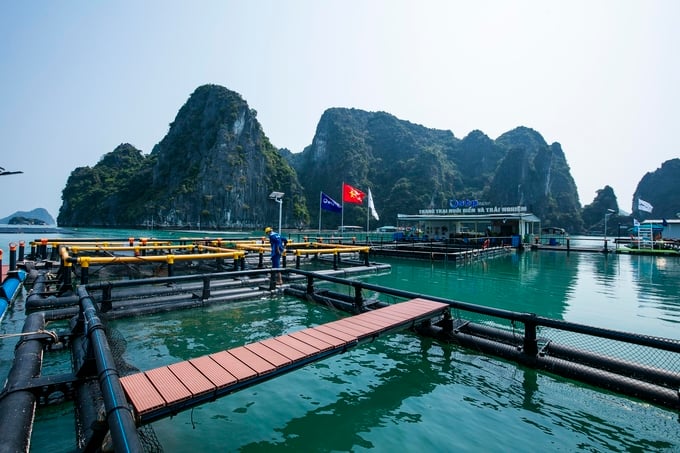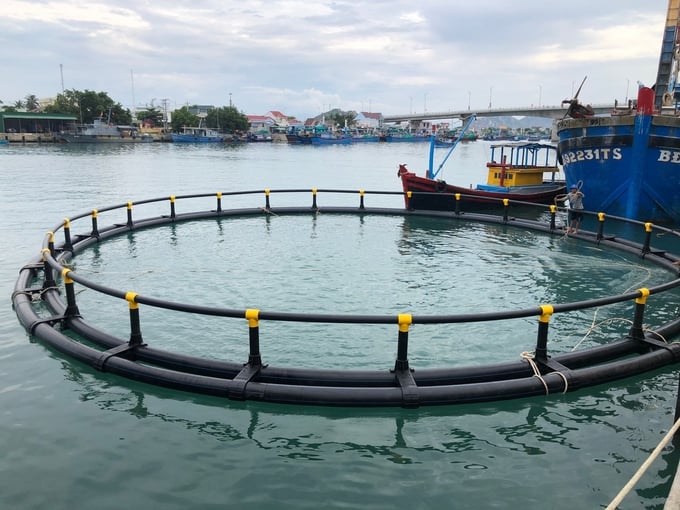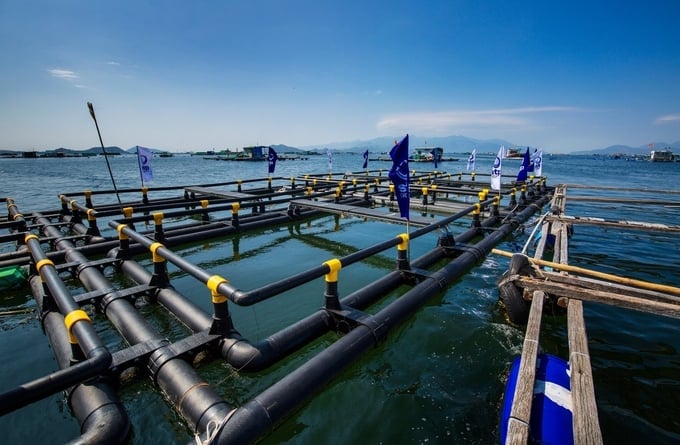June 14, 2025 | 15:08 GMT +7
June 14, 2025 | 15:08 GMT +7
Hotline: 0913.378.918
June 14, 2025 | 15:08 GMT +7
Hotline: 0913.378.918

A mariculture farm in Van Don district, Quang Ninh province with multiple HDPE cages.
In the past, Vietnamese fishermen commonly practiced aquaculture using wooden/bamboo cages supported by foam buoys or plastic cages, which offered the advantage of cost-effectiveness.
However, this model featured several drawbacks including low durability, environmental pollution, low productivity, and a notable lack of resilience to storms.
Recognizing these challenges, STP Group introduced a solution for aquaculture using HDPE cages. This innovative technology marks a recent introduction in aquaculture practices across various provinces and cities.
HDPE, a polymer known for its corrosion resistance and ability to withstand pressure, serves as an environmentally friendly material.
By utilizing HDPE aquaculture cages, fishermen can minimize environmental impact and benefit from increased productivity, reduced costs, and prolonged usage without corrosion concerns.
STP Group introduced three comprehensive support packages aimed at fisherman to enable rapid and convenient access to this modern mariculture technology.
Firstly, under the installment plan package, fishermen are provided with preferential installment payment assistance for a duration of five years. After three to five years, fishermen will be granted ownership of these assets.
This support package allows fishermen to split the payment into smaller installments on a monthly/quarterly basis, thereby alleviating financial burdens.

HDPE round mariculture cages enable fishermen to increase productivity and reduce costs.
Notably, fishermen are not required to pledge collateral to own HDPE aquaculture cages, which allow them to focus on improving production.
With installment packages, fishermen will receive a 50% reduction in initial investment costs for infrastructure, construction, installation, maintenance per quarter per year; and complimentary products such as nets, anchors and so on.
Secondly, under the full investment cost support package, despite the high initial costs, STP Group will support fishermen with up to 30% of the costs to transition from a traditional wooden cage system to modern HDPE aquaculture cages.
Additionally, fishermen will receive installation instructions from experts; high-tech aquaculture equipment minimizes risks in the farming process; connections with reputable seeds and feed suppliers, as well as participation in an ecosystem chain allow fishermen to enhance the value of their output products.

STP Group also offers square cages suitable for various mariculture models.
Thirdly, under the leasing package, fishermen have the option to lease HDPE cages for a small monthly fee and pay quarterly/yearly, with payments made on a quarterly/yearly basis, as an alternative to committing to a substantial upfront investment.
In addition to rental fees, STP Group provides free transportation, installation, maintenance, and quarterly/yearly servicing.
Furthermore, fishermen have the opportunity to participate in STP Group's integrated ecosystem, and receive support from cooperatives, seed suppliers, and regional institutes throughout the production process.
With this support package, fishermen are required to invest a minimal upfront amount, followed by affordable monthly payments.
Fishermen can save on labor resources and minimize repair expenses compared to traditional cage systems made of wooden rafts and plastic barrels.
Notably, STP Group will transfer the ownership of leased products to fishermen after five years.
Fishermen collaborating with STP Group under any of these three packages will receive support in purchasing high-quality seedlings at preferential prices. They will also receive free expert consultation on resolving challenges during the production process, and quarterly/yearly maintenance services. The company will support product distribution at competitive market prices.
Translated by Nguyen Hai Long

(VAN) The working delegation from the Ministry of Agriculture and Environment conducted an important trip to the Netherlands to strengthen strategic partnerships and sustainable development in the agricultural sector.

(VAN) The letter ‘A Plea from the Ocean’ not only evokes emotion but also awakens the human conscience to the responsibility of protecting life on Earth.

(VAN) The Department of Agriculture in South Africa has announced the country’s first mass vaccination of poultry to prevent local birds from contracting avian influenza.

(VAN) Establishment of the Mekong Delta Regional Agricultural Linkage Center, aiming for a closed value chain, deep processing, trading platforms, and international market connectivity.

(VAN) Gia Lai province has recently recorded 460 rare species of animals and plants, contributing to forest conservation and biodiversity planning in the region.

(VAN) Ms. Caroline Beresford, New Zealand Ambassador to Vietnam, expressed confidence that agricultural cooperation between Vietnam and New Zealand will develop sustainably, be climate-resilient, and promote gender equality.

(VAN) Vietnam reaffirms its commitment to international cooperation in fostering sustainable and responsible fisheries while ensuring resilient livelihoods for small-scale fishing communities.